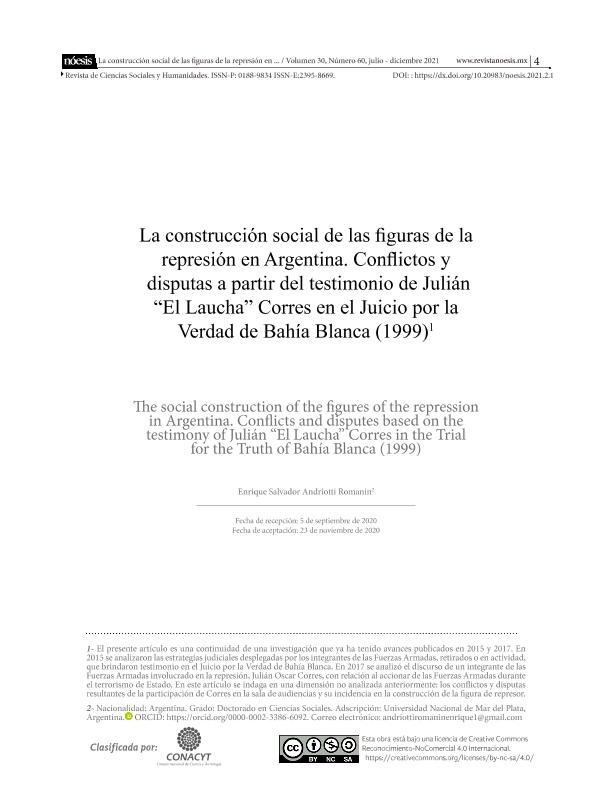Artículo
A finales de la década de los años 90? se realizó en Bahía Blanca, Argentina, uno de los denominados Juicios por la Verdad. En ese marco, el teniente coronel Julián Oscar Corres se convirtió en el primer militar argentino en actividad en brindar testimonio judicial tras las leyes y decretos que impidieron la persecución penal a los perpetradores de las violaciones a los derechos humanos cometidas entre 1976 y 1983. En este trabajo se analizan las disputas y conflictos ocurridos en torno a la participación de Corres en este juicio con el objetivo de aportar a la comprensión de los procesos sociales y políticos que intervinieron en la construcción de la figura de los perpetradores de crímenes durante el terrorismo de Estado en la Argentina. Para la realización de esta investigación se trabajó con una metodología de análisis cualitativa basada en el estudio de un caso a partir de distintas fuentes audiovisuales, periodísticas y entrevistas en profundidad a operadores judiciales y testigos sobrevivientes que participaron como testigos en el Juicio por la Verdad de Bahía Blanca. At the end of the 90s, one of the so-called Truth Trials was held in Bahía Blanca, Argentina. Within this context, Lieutenant Colonel Julián Oscar Corres became the first active Argentine military officer to give judicial testimony following the laws and decrees that prevented criminal prosecution of those responsible for the human rights violations committed between 1976 and 1983. This paper analyzes the disputes and conflicts that occurred around the participation of Corres in this trial with the aim of contributing to the understanding of the social and political processes that intervened in the construction of the figure of the perpetrators of crimes during State terrorism in Argentina. To carry out this research, we worked with a qualitative analysis methodology based on different audiovisual and journalistic sources and in-depth interviews to judicial operators and surviving witnesses who participated as witnesses in the Bahia Blanca Truth Trial.
La construcción social de las figuras de la represión en Argentina: Conflictos y disputas a partir del testimonio de Julián “El Laucha” Corres en el Juicio por la Verdad de Bahía Blanca (1999)
Título:
The social construction of the figures of the repression in Argentina: Conflicts and disputes based on the testimony of Julián “El Laucha” Corres in the Trial for the Truth of Bahía Blanca (1999)
Fecha de publicación:
08/2021
Editorial:
Universidad Autónoma de Ciudad Juárez. Instituto de Ciencias Sociales y Administración
Revista:
Nóesis
ISSN:
2395-8669
Idioma:
Español
Tipo de recurso:
Artículo publicado
Clasificación temática:
Resumen
Palabras clave:
ARGENTINA
,
JUICIO
,
TERRORISMO DE ESTADO
,
MEMORIA
Archivos asociados
Licencia
Identificadores
Colecciones
Articulos(CCT - MAR DEL PLATA)
Articulos de CTRO.CIENTIFICO TECNOL.CONICET - MAR DEL PLATA
Articulos de CTRO.CIENTIFICO TECNOL.CONICET - MAR DEL PLATA
Citación
Andriotti Romanin, Enrique Salvador; La construcción social de las figuras de la represión en Argentina: Conflictos y disputas a partir del testimonio de Julián “El Laucha” Corres en el Juicio por la Verdad de Bahía Blanca (1999); Universidad Autónoma de Ciudad Juárez. Instituto de Ciencias Sociales y Administración; Nóesis; 30; 60; 8-2021; 1-16
Compartir
Altmétricas




